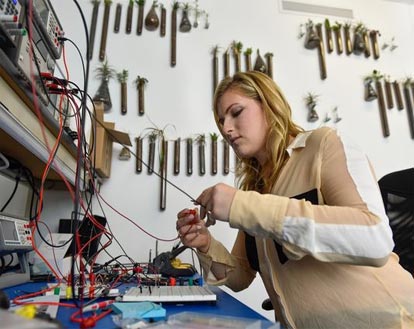Meredith Perry, an inventor from New Jersey, has introduced her plans to “get rid of the power cord.” Perry has been working on a project at her company, uBeam, that involves producing a method to charge electronic devices over thin air. Ultimately, the uBeam Transmitter was born.
“The dream is to replace all electrical outlets with uBeam transmitters. You’ll wake up and just go through your day with your device and it will be charging in your house, in your car, at your bus stop, at your gym, in your hotel. We want to be absolutely everywhere. And wires won’t be anywhere,” Perry said.
The uBeam transmitter is a wafer-thin square that punches out ultrasonic frequencies. Because smartphones produce sound at the same high frequency, the receiver (smartphone) turns the movement into energy, thus charging the device. The transmitter cannot go through walls; therefore, a square tile is required for each room.
With financial backing from Mark Cuban, Marissa Mayer, Peter Theil’s Founder’s Fund, and Upfront Ventures, Perry has raised millions of dollars in funding and the company has the potential to make billions. This funding allowed Perry to shrink her transmitter device and make other adjustments.
The standard for wireless charging is constantly being raised, as it is becoming more widespread. Corporations, such a Starbucks and McDonalds, now offer wireless charging options. Even certain cars, such as the 2015 Toyota Camry, now feature built-in wireless charging pads.
“Wireless charging is still in its innovation phase, but it is expected to mushroom as consumers add devices to their lives and grow increasingly frustrated with the chore of keeping them powered up. In 2013, pad-based wireless charging was a $213 million market in the U.S., but that will grow 40 times within five years to around $10 billion,” David Green, research manager for IHS, said.
These transmitters are ideal for use in homes, businesses, or any other commercial space where smartphones and other electronic devices are used. Perry is confident the uBeam transmitter will be consumer-ready within the next few years.





